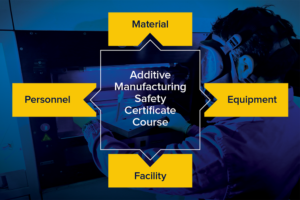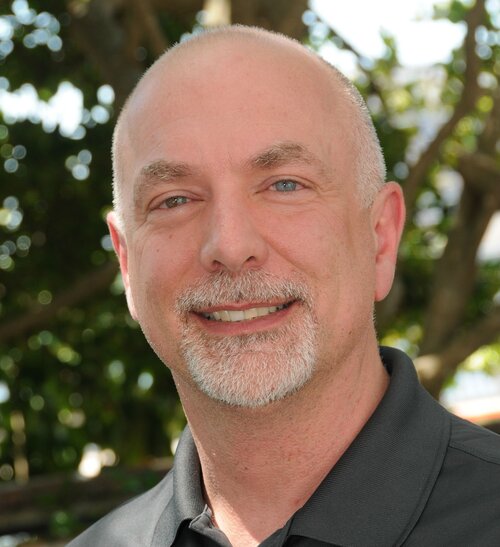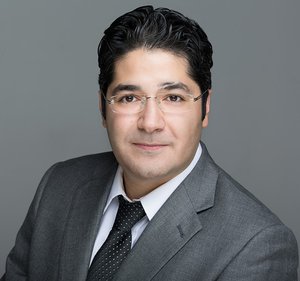About the Course
With more and more industrial sectors adopting additive manufacturing (AM) technology, there is a growing need to fully understand safety of its use. Proper implementation of safe practices is needed to support the rapid growth of the field. As a leading driver of AM technology, ASTM is committed to filling the AM safety knowledge gap by providing world-class training from industry leaders to support the use of AM and keeping its workforce safe.
The AM CoE’s training is tailored to industry needs and incorporates the latest technological advances and standards to prepare students to take on the current challenges in the field. This course is based on learning and leveraging all the different regulatory standards and codes applicable to AM. It takes proven safety management tools and plugs the AM specific needs into them.
The AM safety course provides knowledge on the general elements needed when setting up a facility for AM and the safety issues to be considered during the life of the AM processes:
- The different regulatory standards and codes applicable to AM
- Provides guidance on how these standards can apply to your facility
- Identify some of the most relevant standards and how they are specifically applied to preserving the safety and wellbeing of all employees using additive manufacturing technologies
- Understanding many of the safety elements and best practices that need to be considered when:
- establishing your AM facility
- handling AM materials
- performing post-processing
- responding to an emergency situation
Who Should Attend?
- Users, engineers, and managers of an AM facility
- Environment, Health, and Safety Managers
- Novice to advanced AM users
- Individuals from government agencies, industry, and academia
Why Sign Up for This Course?
- Gain awareness of AM safety and the application of safe practices
- Stand out in the industry with ASTM E2659-18-compliant certificate from the globally recognized ASTM AM CoE
- Chart your own path: This course is the one step toward multiple AM CoE role-based certificates
- Designed and led by AM safety experts
- Earn a digital badge after successful completion of this course
What is a Digital Badge?
These badges are an innovative way to showcase career knowledge, skills, and abilities obtained through professional development. Add the badges to your digital portfolios or share on social and professional networks.
Learning Outcomes
Upon successful completion of this course, as a minimum the participants should be able to:
- Name and describe standards and codes applicable to AM processes
- Understand current best practices related to AM safety
- Recognize and document hazards presented by the AM materials, equipment and facility
- Know how to then mitigate these risks
- Identify many of the facility and equipment design requirements that enhance safety
- Pin-point needed safety controls (engineering, administrative, Personal Protective Equipment) during the life of an AM process
- Understand how to handle and store waste materials generated from the AM process
- Identify ways to implement emergency response and security program
Instructor
-
Instructor
Paul Bates
Show MorePaul Bates is an Additive Manufacturing Lead Project Engineer for the ASTM International Additive Manufacturing Center of Excellence. In his role, he brings his technical expertise to drive the projects in Additive Manufacturing training, safety, and certification. He is an industry-recognized AM veteran. Before joining ASTM, Bates was the Manager for Facility safety and Workforce Development in Additive Manufacturing at UL and served 20+ years at Reebok, where he guided the global athletic footwear leader’s Additive Manufacturing Lab and 3D CAD Team as the Director of Advanced Process Engineering. A 2012 recipient of the Additive Manufacturing User Group (AMUG) “Dinosaur” Award, Bates is fluent in numerous AM processes, including DMLS, SLS, FDM, and PolyJet. He is the Past President of the Additive Manufacturing Users Group (AMUG). He has a BS degree in Design Technology from Bowling Green State University, Bowling Green OH, and a Master’s Degree in Technology Management from the University of Phoenix.
Technical Chairs
-
ASTM International
Khalid Rafi
-
ASTM International
Mohsen Seifi
-
ASTM International
Paul Bates






